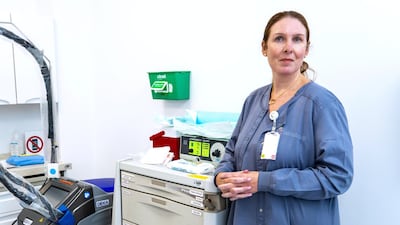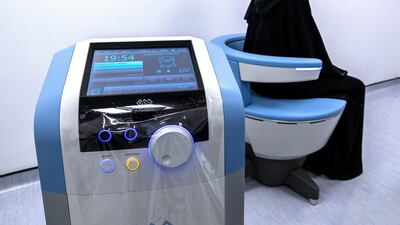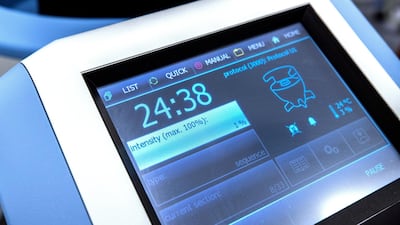A hospital in Abu Dhabi is changing the lives of women who suffer from incontinence, with a breakthrough treatment.
Up to 60 per cent of women suffer from stress incontinence at some point in their lives, many from the consequences of pregnancy, vaginal childbirth or ageing.
The disorder is caused by weakened pelvic floor muscles, and makes women lose control of their bladder when they cough, stand, sneeze or move suddenly.
Dr Tracey Sims is the lead physician at the Aesthetic Clinic for Feminine Rejuvenation at Corniche hospital, the largest maternity healthcare centre run by Seha, Abu Dhabi's public hospital operator.
“This is a problem, which we know as clinicians, that is under-identified and under-treated,” she said.
"Women find it very embarrassing and research has shown that it takes women an average of three years to present to a clinician.
“It is something that women are suffering from on a daily basis, but are not necessarily receiving assistance for it.”
Treatments were previously limited to physiotherapy and invasive surgery, but that has now changed, Dr Sims said.
“This is something I personally felt very strongly about. Women who didn’t want surgery thought that there was nothing they could do about it, and they just had to accept it," she said.
"But by simply strengthening the pelvic floor muscles rapidly and intensively we can quickly make this problem much better.”
Breakthrough treatment

Traditionally women are taught to strengthen their pelvic floor muscles by stopping their flow of urine on the lavatory, and then by tensing those same muscles regularly, in particular after giving birth.
These are known as "Kegel exercises", named after the American gynecologist Arnold Kegel who first published a description of the muscle training in 1948.
Dr Sims's new treatment involves a specially designed device called the "Emsella chair", which uses advanced electromagnetic technology.
It delivers thousands of Kegel-like supramaximal contractions – high-tension muscle contractions that exceed the highest amount of tension the muscles can usually exert and hold – to the entire pelvic floor.
All that is required is that the patient sits fully clothed on a chair for six 30-minute sessions.
A clinical trial in 2019 showed that 61 out of 75 patients reported significant reduction of their symptoms. But in the UAE, as elsewhere in the world, the treatment is often not covered by insurance, and is expensive.
“This service is fulfilling a niche," said Dr Sims. "It is complementary to the obstetrics and gynaecology services offered here at Corniche – it is the missing link.
"My conviction is that it should be as widely accessible and available to women as possible.
“Women are tolerating symptoms and putting up with things like a bit of stress incontinence, a bit of prolapse because they felt, 'Oh I have children so I have to put up with that,' or 'I have to expect that.'
“I have had women who wanted to jog or run or attend a fitness class but could not because they would leak."
In the UAE specifically, Dr Sims said she has seen many women who would find it difficult to pray because every time they would bend for prayer they would leak, and would have to stop their prayer and repeat their ablutions.
Physiotherapy and strength training
Gynecologists normally refer patients with urinary incontinence and pelvic floor dysfunction to a physiotherapist as a first step, unless the case is severe, in which case surgical intervention may need to be considered.
The treatment involves pelvic floor and core stability strengthening exercises, said Anub Thomas, a physiotherapy supervisor at women and children's hospital Danat Al Emarat in Abu Dhabi.
"Physiotherapy provides the support needed and can also help prevent this condition, with prenatal and postnatal exercising sessions that may help," he said.
"This is an evidence-based proven approach, which involves 10 to 12 sessions of 30 to 45 minutes, twice a week for six weeks.
"Additionally, we use pelvic floor electrical stimulation and biofeedback machines for treatment."
In most cases, these sessions are covered by insurance, said Mr Thomas.
"If the patient is diagnosed with urinary incontinence or pelvic floor dysfunction, and referred by a gynaecologist to a physiotherapist."
Dr Sims said the services offered by the Aesthetic Clinic at Corniche hospital are proving popular, with more than 10 patients a day from different nationalities.
"Just because women have children, or just because they age, they don't need to accept and put up with things like incontinence," she said.
"These are procedures that can make the lives of women more tolerable, and it is important that women feel well, confident, strong and happy.”





